Research Proposal: Benefits of Eco-Friendly Cars in Developed Nations
VerifiedAdded on 2022/11/13
|10
|2571
|400
Report
AI Summary
This document presents a comprehensive research proposal and dissertation focusing on the benefits of eco-friendly cars in developed countries. The study employs a systematic review of secondary data to analyze the advantages of eco-friendly vehicles, including their positive impacts on the environment, health, and economic sustainability. The research explores the shift towards eco-friendly cars, driven by environmental concerns and technological advancements. The findings highlight the reduced carbon emissions, decreased oil dependency, and lower operational costs associated with these vehicles. The research also delves into the role of government policies, technological advancements, and consumer behavior in promoting the adoption of eco-friendly cars. The dissertation provides recommendations for policy changes, subsidies, and infrastructure development to accelerate the transition towards sustainable transportation. Furthermore, the study emphasizes the need for increased consumer awareness and market share for eco-friendly cars. The conclusion summarizes the key benefits and limitations of eco-friendly cars, emphasizing the importance of sustainable practices and the development of a greener transport sector.

Running head: RESEARCH PROPOSAL
RESEARCH PROPOSAL
Name of the student
Name of the university
Author note
RESEARCH PROPOSAL
Name of the student
Name of the university
Author note
Paraphrase This Document
Need a fresh take? Get an instant paraphrase of this document with our AI Paraphraser
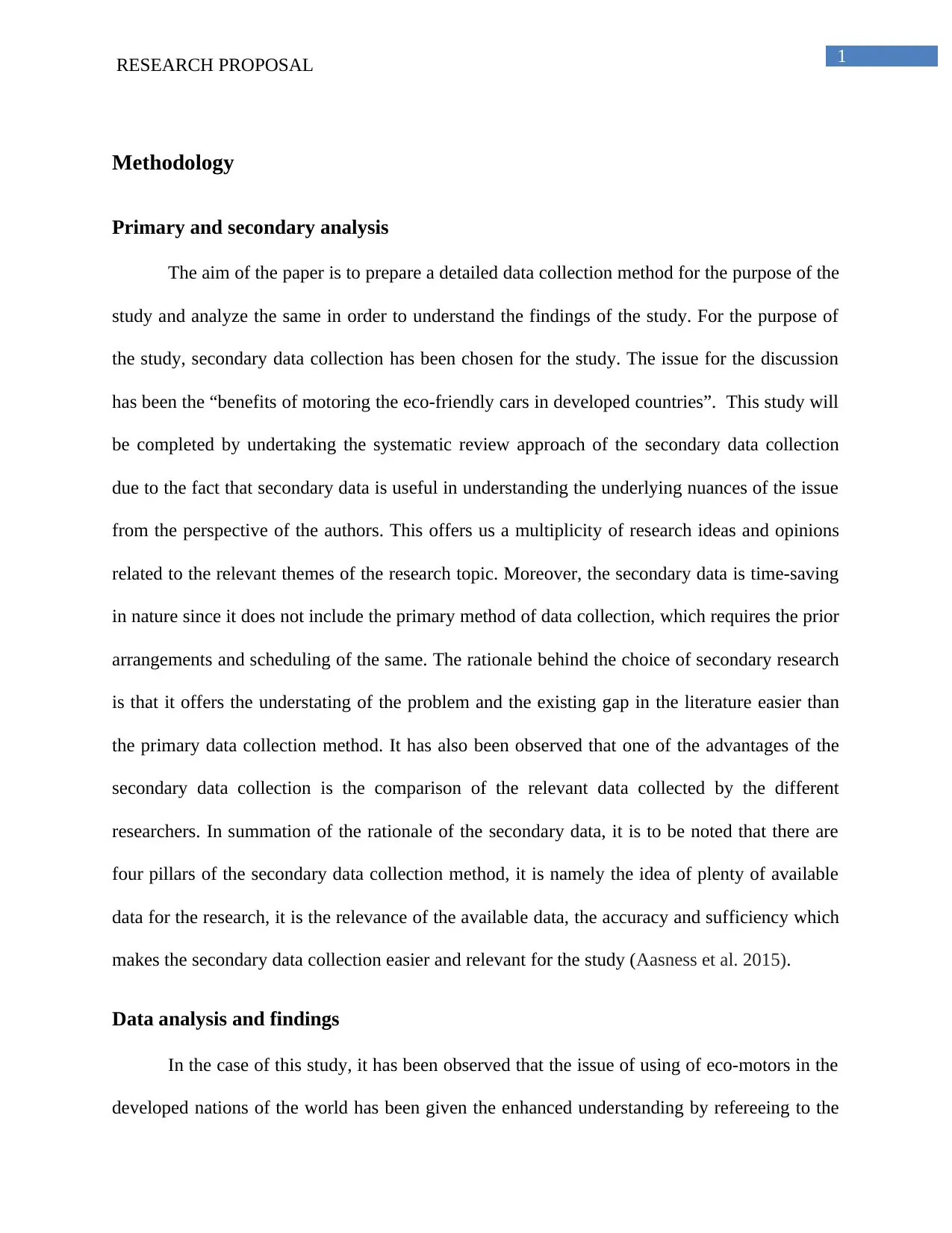
1RESEARCH PROPOSAL
Methodology
Primary and secondary analysis
The aim of the paper is to prepare a detailed data collection method for the purpose of the
study and analyze the same in order to understand the findings of the study. For the purpose of
the study, secondary data collection has been chosen for the study. The issue for the discussion
has been the “benefits of motoring the eco-friendly cars in developed countries”. This study will
be completed by undertaking the systematic review approach of the secondary data collection
due to the fact that secondary data is useful in understanding the underlying nuances of the issue
from the perspective of the authors. This offers us a multiplicity of research ideas and opinions
related to the relevant themes of the research topic. Moreover, the secondary data is time-saving
in nature since it does not include the primary method of data collection, which requires the prior
arrangements and scheduling of the same. The rationale behind the choice of secondary research
is that it offers the understating of the problem and the existing gap in the literature easier than
the primary data collection method. It has also been observed that one of the advantages of the
secondary data collection is the comparison of the relevant data collected by the different
researchers. In summation of the rationale of the secondary data, it is to be noted that there are
four pillars of the secondary data collection method, it is namely the idea of plenty of available
data for the research, it is the relevance of the available data, the accuracy and sufficiency which
makes the secondary data collection easier and relevant for the study (Aasness et al. 2015).
Data analysis and findings
In the case of this study, it has been observed that the issue of using of eco-motors in the
developed nations of the world has been given the enhanced understanding by refereeing to the
Methodology
Primary and secondary analysis
The aim of the paper is to prepare a detailed data collection method for the purpose of the
study and analyze the same in order to understand the findings of the study. For the purpose of
the study, secondary data collection has been chosen for the study. The issue for the discussion
has been the “benefits of motoring the eco-friendly cars in developed countries”. This study will
be completed by undertaking the systematic review approach of the secondary data collection
due to the fact that secondary data is useful in understanding the underlying nuances of the issue
from the perspective of the authors. This offers us a multiplicity of research ideas and opinions
related to the relevant themes of the research topic. Moreover, the secondary data is time-saving
in nature since it does not include the primary method of data collection, which requires the prior
arrangements and scheduling of the same. The rationale behind the choice of secondary research
is that it offers the understating of the problem and the existing gap in the literature easier than
the primary data collection method. It has also been observed that one of the advantages of the
secondary data collection is the comparison of the relevant data collected by the different
researchers. In summation of the rationale of the secondary data, it is to be noted that there are
four pillars of the secondary data collection method, it is namely the idea of plenty of available
data for the research, it is the relevance of the available data, the accuracy and sufficiency which
makes the secondary data collection easier and relevant for the study (Aasness et al. 2015).
Data analysis and findings
In the case of this study, it has been observed that the issue of using of eco-motors in the
developed nations of the world has been given the enhanced understanding by refereeing to the
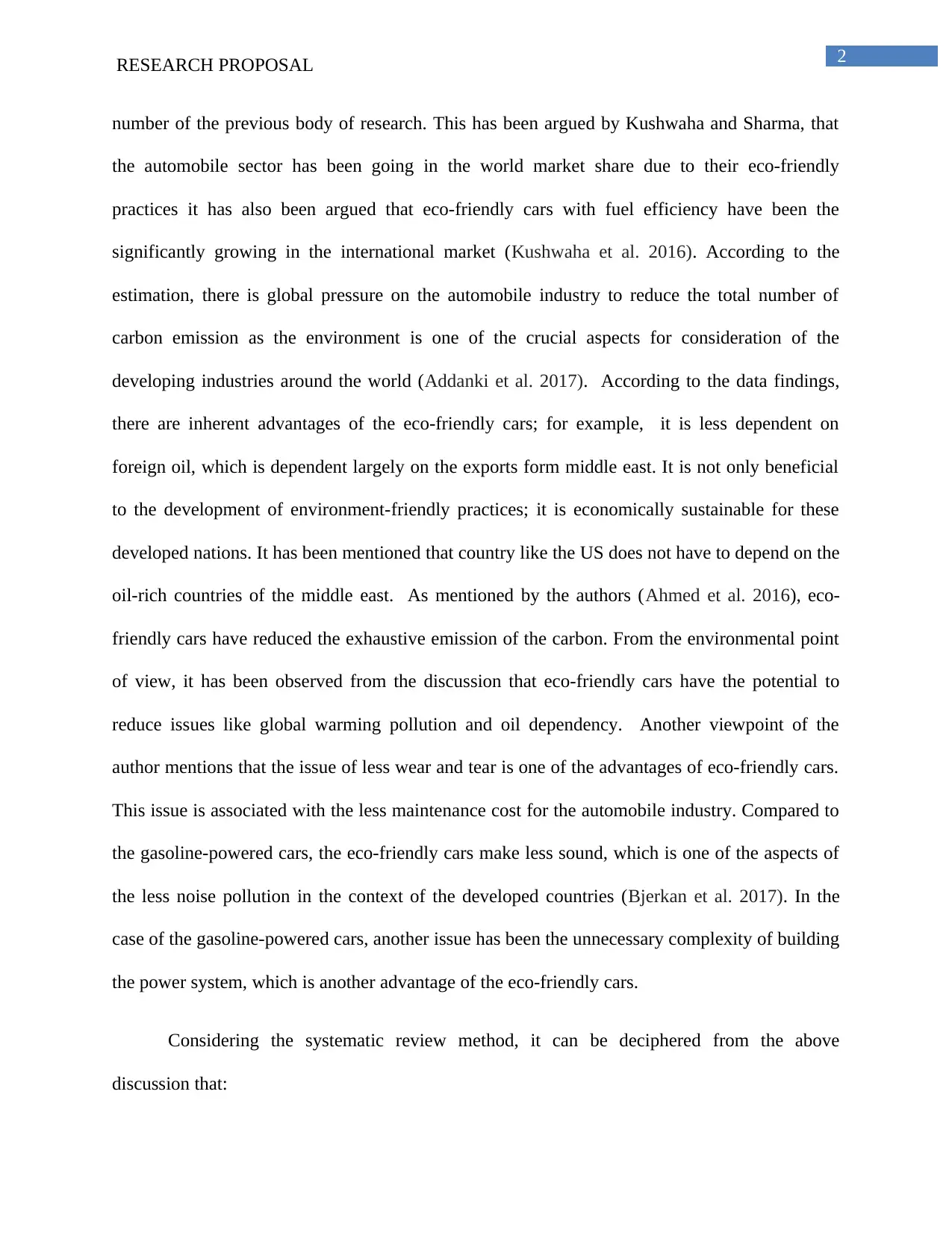
2RESEARCH PROPOSAL
number of the previous body of research. This has been argued by Kushwaha and Sharma, that
the automobile sector has been going in the world market share due to their eco-friendly
practices it has also been argued that eco-friendly cars with fuel efficiency have been the
significantly growing in the international market (Kushwaha et al. 2016). According to the
estimation, there is global pressure on the automobile industry to reduce the total number of
carbon emission as the environment is one of the crucial aspects for consideration of the
developing industries around the world (Addanki et al. 2017). According to the data findings,
there are inherent advantages of the eco-friendly cars; for example, it is less dependent on
foreign oil, which is dependent largely on the exports form middle east. It is not only beneficial
to the development of environment-friendly practices; it is economically sustainable for these
developed nations. It has been mentioned that country like the US does not have to depend on the
oil-rich countries of the middle east. As mentioned by the authors (Ahmed et al. 2016), eco-
friendly cars have reduced the exhaustive emission of the carbon. From the environmental point
of view, it has been observed from the discussion that eco-friendly cars have the potential to
reduce issues like global warming pollution and oil dependency. Another viewpoint of the
author mentions that the issue of less wear and tear is one of the advantages of eco-friendly cars.
This issue is associated with the less maintenance cost for the automobile industry. Compared to
the gasoline-powered cars, the eco-friendly cars make less sound, which is one of the aspects of
the less noise pollution in the context of the developed countries (Bjerkan et al. 2017). In the
case of the gasoline-powered cars, another issue has been the unnecessary complexity of building
the power system, which is another advantage of the eco-friendly cars.
Considering the systematic review method, it can be deciphered from the above
discussion that:
number of the previous body of research. This has been argued by Kushwaha and Sharma, that
the automobile sector has been going in the world market share due to their eco-friendly
practices it has also been argued that eco-friendly cars with fuel efficiency have been the
significantly growing in the international market (Kushwaha et al. 2016). According to the
estimation, there is global pressure on the automobile industry to reduce the total number of
carbon emission as the environment is one of the crucial aspects for consideration of the
developing industries around the world (Addanki et al. 2017). According to the data findings,
there are inherent advantages of the eco-friendly cars; for example, it is less dependent on
foreign oil, which is dependent largely on the exports form middle east. It is not only beneficial
to the development of environment-friendly practices; it is economically sustainable for these
developed nations. It has been mentioned that country like the US does not have to depend on the
oil-rich countries of the middle east. As mentioned by the authors (Ahmed et al. 2016), eco-
friendly cars have reduced the exhaustive emission of the carbon. From the environmental point
of view, it has been observed from the discussion that eco-friendly cars have the potential to
reduce issues like global warming pollution and oil dependency. Another viewpoint of the
author mentions that the issue of less wear and tear is one of the advantages of eco-friendly cars.
This issue is associated with the less maintenance cost for the automobile industry. Compared to
the gasoline-powered cars, the eco-friendly cars make less sound, which is one of the aspects of
the less noise pollution in the context of the developed countries (Bjerkan et al. 2017). In the
case of the gasoline-powered cars, another issue has been the unnecessary complexity of building
the power system, which is another advantage of the eco-friendly cars.
Considering the systematic review method, it can be deciphered from the above
discussion that:
⊘ This is a preview!⊘
Do you want full access?
Subscribe today to unlock all pages.

Trusted by 1+ million students worldwide
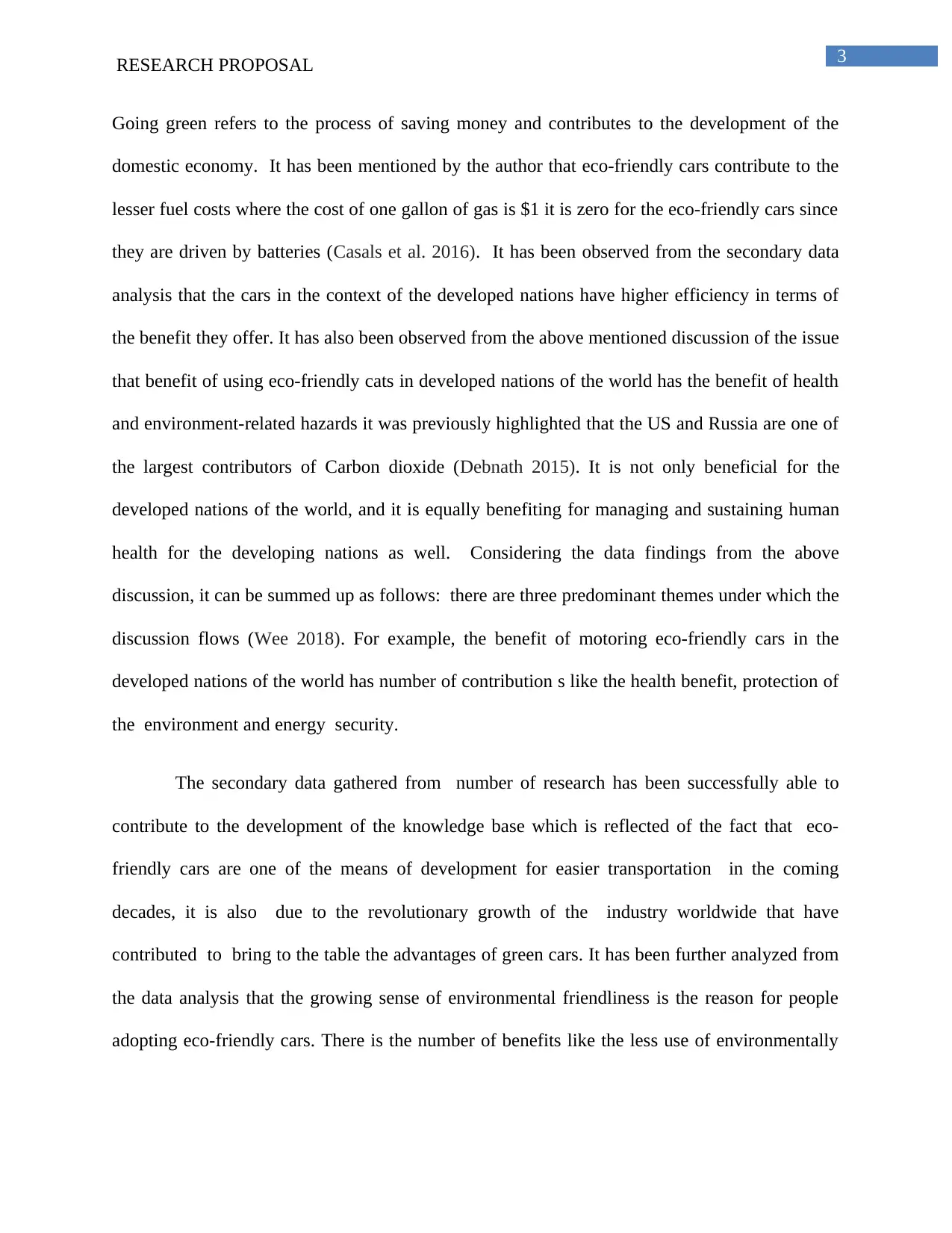
3RESEARCH PROPOSAL
Going green refers to the process of saving money and contributes to the development of the
domestic economy. It has been mentioned by the author that eco-friendly cars contribute to the
lesser fuel costs where the cost of one gallon of gas is $1 it is zero for the eco-friendly cars since
they are driven by batteries (Casals et al. 2016). It has been observed from the secondary data
analysis that the cars in the context of the developed nations have higher efficiency in terms of
the benefit they offer. It has also been observed from the above mentioned discussion of the issue
that benefit of using eco-friendly cats in developed nations of the world has the benefit of health
and environment-related hazards it was previously highlighted that the US and Russia are one of
the largest contributors of Carbon dioxide (Debnath 2015). It is not only beneficial for the
developed nations of the world, and it is equally benefiting for managing and sustaining human
health for the developing nations as well. Considering the data findings from the above
discussion, it can be summed up as follows: there are three predominant themes under which the
discussion flows (Wee 2018). For example, the benefit of motoring eco-friendly cars in the
developed nations of the world has number of contribution s like the health benefit, protection of
the environment and energy security.
The secondary data gathered from number of research has been successfully able to
contribute to the development of the knowledge base which is reflected of the fact that eco-
friendly cars are one of the means of development for easier transportation in the coming
decades, it is also due to the revolutionary growth of the industry worldwide that have
contributed to bring to the table the advantages of green cars. It has been further analyzed from
the data analysis that the growing sense of environmental friendliness is the reason for people
adopting eco-friendly cars. There is the number of benefits like the less use of environmentally
Going green refers to the process of saving money and contributes to the development of the
domestic economy. It has been mentioned by the author that eco-friendly cars contribute to the
lesser fuel costs where the cost of one gallon of gas is $1 it is zero for the eco-friendly cars since
they are driven by batteries (Casals et al. 2016). It has been observed from the secondary data
analysis that the cars in the context of the developed nations have higher efficiency in terms of
the benefit they offer. It has also been observed from the above mentioned discussion of the issue
that benefit of using eco-friendly cats in developed nations of the world has the benefit of health
and environment-related hazards it was previously highlighted that the US and Russia are one of
the largest contributors of Carbon dioxide (Debnath 2015). It is not only beneficial for the
developed nations of the world, and it is equally benefiting for managing and sustaining human
health for the developing nations as well. Considering the data findings from the above
discussion, it can be summed up as follows: there are three predominant themes under which the
discussion flows (Wee 2018). For example, the benefit of motoring eco-friendly cars in the
developed nations of the world has number of contribution s like the health benefit, protection of
the environment and energy security.
The secondary data gathered from number of research has been successfully able to
contribute to the development of the knowledge base which is reflected of the fact that eco-
friendly cars are one of the means of development for easier transportation in the coming
decades, it is also due to the revolutionary growth of the industry worldwide that have
contributed to bring to the table the advantages of green cars. It has been further analyzed from
the data analysis that the growing sense of environmental friendliness is the reason for people
adopting eco-friendly cars. There is the number of benefits like the less use of environmentally
Paraphrase This Document
Need a fresh take? Get an instant paraphrase of this document with our AI Paraphraser
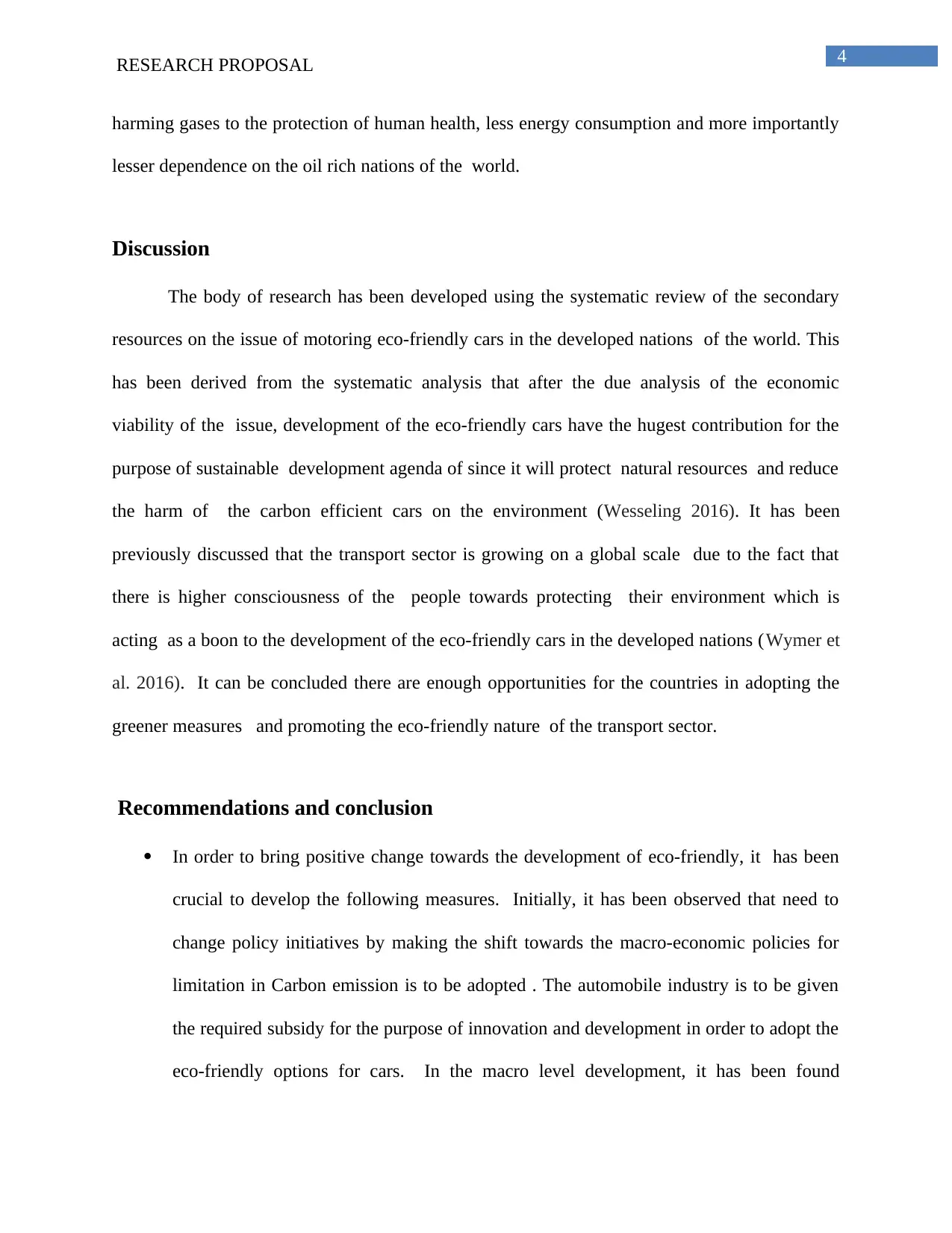
4RESEARCH PROPOSAL
harming gases to the protection of human health, less energy consumption and more importantly
lesser dependence on the oil rich nations of the world.
Discussion
The body of research has been developed using the systematic review of the secondary
resources on the issue of motoring eco-friendly cars in the developed nations of the world. This
has been derived from the systematic analysis that after the due analysis of the economic
viability of the issue, development of the eco-friendly cars have the hugest contribution for the
purpose of sustainable development agenda of since it will protect natural resources and reduce
the harm of the carbon efficient cars on the environment (Wesseling 2016). It has been
previously discussed that the transport sector is growing on a global scale due to the fact that
there is higher consciousness of the people towards protecting their environment which is
acting as a boon to the development of the eco-friendly cars in the developed nations (Wymer et
al. 2016). It can be concluded there are enough opportunities for the countries in adopting the
greener measures and promoting the eco-friendly nature of the transport sector.
Recommendations and conclusion
In order to bring positive change towards the development of eco-friendly, it has been
crucial to develop the following measures. Initially, it has been observed that need to
change policy initiatives by making the shift towards the macro-economic policies for
limitation in Carbon emission is to be adopted . The automobile industry is to be given
the required subsidy for the purpose of innovation and development in order to adopt the
eco-friendly options for cars. In the macro level development, it has been found
harming gases to the protection of human health, less energy consumption and more importantly
lesser dependence on the oil rich nations of the world.
Discussion
The body of research has been developed using the systematic review of the secondary
resources on the issue of motoring eco-friendly cars in the developed nations of the world. This
has been derived from the systematic analysis that after the due analysis of the economic
viability of the issue, development of the eco-friendly cars have the hugest contribution for the
purpose of sustainable development agenda of since it will protect natural resources and reduce
the harm of the carbon efficient cars on the environment (Wesseling 2016). It has been
previously discussed that the transport sector is growing on a global scale due to the fact that
there is higher consciousness of the people towards protecting their environment which is
acting as a boon to the development of the eco-friendly cars in the developed nations (Wymer et
al. 2016). It can be concluded there are enough opportunities for the countries in adopting the
greener measures and promoting the eco-friendly nature of the transport sector.
Recommendations and conclusion
In order to bring positive change towards the development of eco-friendly, it has been
crucial to develop the following measures. Initially, it has been observed that need to
change policy initiatives by making the shift towards the macro-economic policies for
limitation in Carbon emission is to be adopted . The automobile industry is to be given
the required subsidy for the purpose of innovation and development in order to adopt the
eco-friendly options for cars. In the macro level development, it has been found
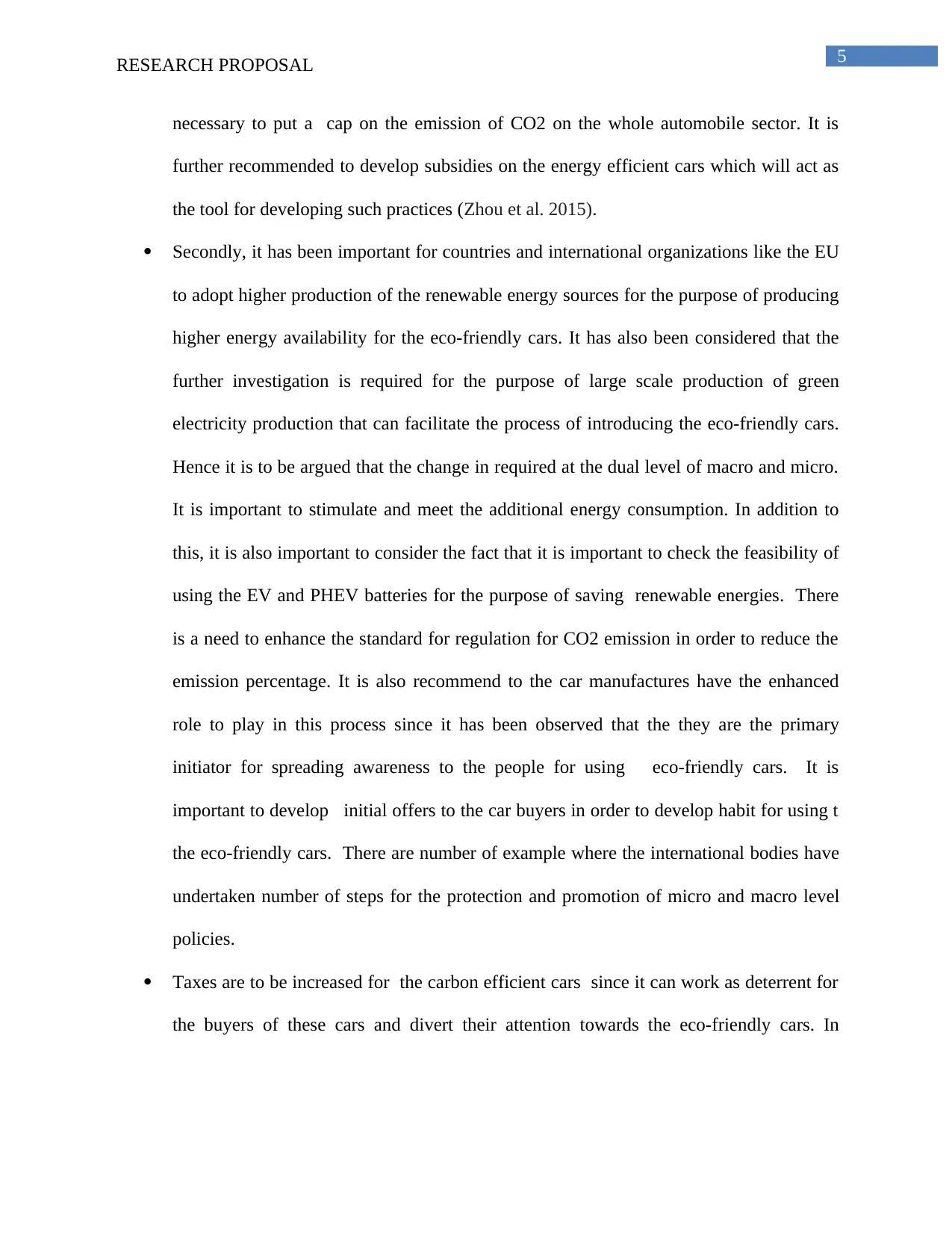
5RESEARCH PROPOSAL
necessary to put a cap on the emission of CO2 on the whole automobile sector. It is
further recommended to develop subsidies on the energy efficient cars which will act as
the tool for developing such practices (Zhou et al. 2015).
Secondly, it has been important for countries and international organizations like the EU
to adopt higher production of the renewable energy sources for the purpose of producing
higher energy availability for the eco-friendly cars. It has also been considered that the
further investigation is required for the purpose of large scale production of green
electricity production that can facilitate the process of introducing the eco-friendly cars.
Hence it is to be argued that the change in required at the dual level of macro and micro.
It is important to stimulate and meet the additional energy consumption. In addition to
this, it is also important to consider the fact that it is important to check the feasibility of
using the EV and PHEV batteries for the purpose of saving renewable energies. There
is a need to enhance the standard for regulation for CO2 emission in order to reduce the
emission percentage. It is also recommend to the car manufactures have the enhanced
role to play in this process since it has been observed that the they are the primary
initiator for spreading awareness to the people for using eco-friendly cars. It is
important to develop initial offers to the car buyers in order to develop habit for using t
the eco-friendly cars. There are number of example where the international bodies have
undertaken number of steps for the protection and promotion of micro and macro level
policies.
Taxes are to be increased for the carbon efficient cars since it can work as deterrent for
the buyers of these cars and divert their attention towards the eco-friendly cars. In
necessary to put a cap on the emission of CO2 on the whole automobile sector. It is
further recommended to develop subsidies on the energy efficient cars which will act as
the tool for developing such practices (Zhou et al. 2015).
Secondly, it has been important for countries and international organizations like the EU
to adopt higher production of the renewable energy sources for the purpose of producing
higher energy availability for the eco-friendly cars. It has also been considered that the
further investigation is required for the purpose of large scale production of green
electricity production that can facilitate the process of introducing the eco-friendly cars.
Hence it is to be argued that the change in required at the dual level of macro and micro.
It is important to stimulate and meet the additional energy consumption. In addition to
this, it is also important to consider the fact that it is important to check the feasibility of
using the EV and PHEV batteries for the purpose of saving renewable energies. There
is a need to enhance the standard for regulation for CO2 emission in order to reduce the
emission percentage. It is also recommend to the car manufactures have the enhanced
role to play in this process since it has been observed that the they are the primary
initiator for spreading awareness to the people for using eco-friendly cars. It is
important to develop initial offers to the car buyers in order to develop habit for using t
the eco-friendly cars. There are number of example where the international bodies have
undertaken number of steps for the protection and promotion of micro and macro level
policies.
Taxes are to be increased for the carbon efficient cars since it can work as deterrent for
the buyers of these cars and divert their attention towards the eco-friendly cars. In
⊘ This is a preview!⊘
Do you want full access?
Subscribe today to unlock all pages.

Trusted by 1+ million students worldwide
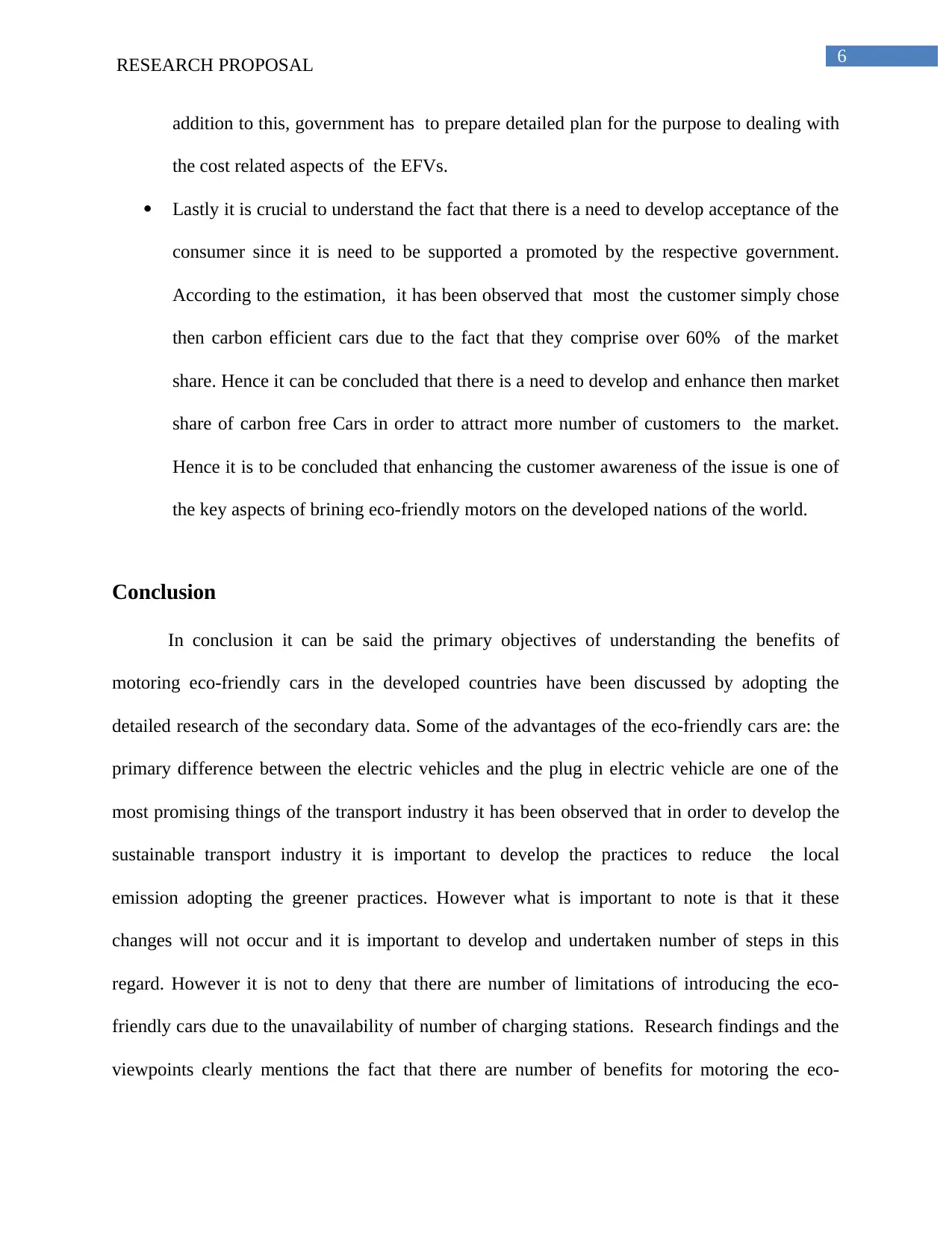
6RESEARCH PROPOSAL
addition to this, government has to prepare detailed plan for the purpose to dealing with
the cost related aspects of the EFVs.
Lastly it is crucial to understand the fact that there is a need to develop acceptance of the
consumer since it is need to be supported a promoted by the respective government.
According to the estimation, it has been observed that most the customer simply chose
then carbon efficient cars due to the fact that they comprise over 60% of the market
share. Hence it can be concluded that there is a need to develop and enhance then market
share of carbon free Cars in order to attract more number of customers to the market.
Hence it is to be concluded that enhancing the customer awareness of the issue is one of
the key aspects of brining eco-friendly motors on the developed nations of the world.
Conclusion
In conclusion it can be said the primary objectives of understanding the benefits of
motoring eco-friendly cars in the developed countries have been discussed by adopting the
detailed research of the secondary data. Some of the advantages of the eco-friendly cars are: the
primary difference between the electric vehicles and the plug in electric vehicle are one of the
most promising things of the transport industry it has been observed that in order to develop the
sustainable transport industry it is important to develop the practices to reduce the local
emission adopting the greener practices. However what is important to note is that it these
changes will not occur and it is important to develop and undertaken number of steps in this
regard. However it is not to deny that there are number of limitations of introducing the eco-
friendly cars due to the unavailability of number of charging stations. Research findings and the
viewpoints clearly mentions the fact that there are number of benefits for motoring the eco-
addition to this, government has to prepare detailed plan for the purpose to dealing with
the cost related aspects of the EFVs.
Lastly it is crucial to understand the fact that there is a need to develop acceptance of the
consumer since it is need to be supported a promoted by the respective government.
According to the estimation, it has been observed that most the customer simply chose
then carbon efficient cars due to the fact that they comprise over 60% of the market
share. Hence it can be concluded that there is a need to develop and enhance then market
share of carbon free Cars in order to attract more number of customers to the market.
Hence it is to be concluded that enhancing the customer awareness of the issue is one of
the key aspects of brining eco-friendly motors on the developed nations of the world.
Conclusion
In conclusion it can be said the primary objectives of understanding the benefits of
motoring eco-friendly cars in the developed countries have been discussed by adopting the
detailed research of the secondary data. Some of the advantages of the eco-friendly cars are: the
primary difference between the electric vehicles and the plug in electric vehicle are one of the
most promising things of the transport industry it has been observed that in order to develop the
sustainable transport industry it is important to develop the practices to reduce the local
emission adopting the greener practices. However what is important to note is that it these
changes will not occur and it is important to develop and undertaken number of steps in this
regard. However it is not to deny that there are number of limitations of introducing the eco-
friendly cars due to the unavailability of number of charging stations. Research findings and the
viewpoints clearly mentions the fact that there are number of benefits for motoring the eco-
Paraphrase This Document
Need a fresh take? Get an instant paraphrase of this document with our AI Paraphraser
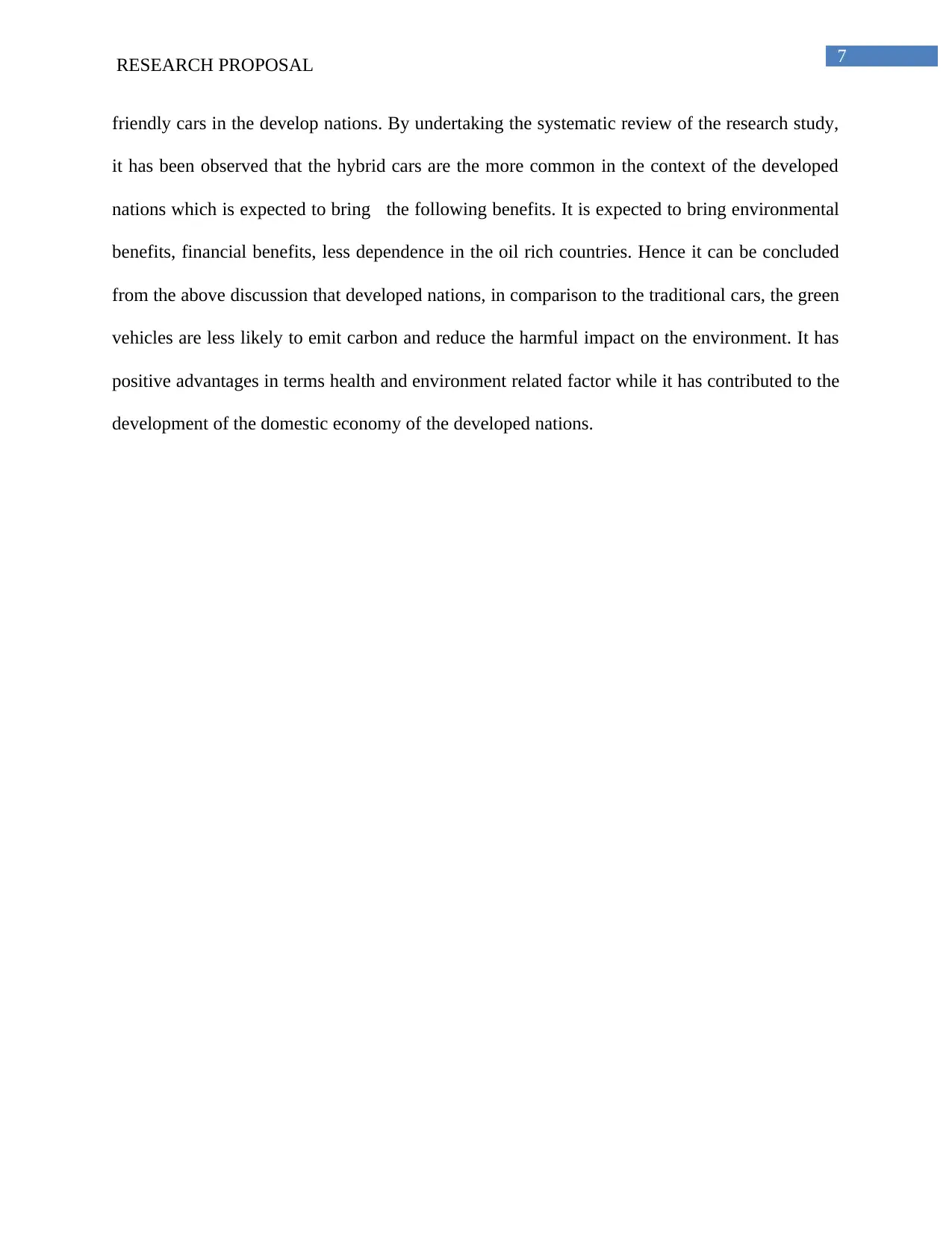
7RESEARCH PROPOSAL
friendly cars in the develop nations. By undertaking the systematic review of the research study,
it has been observed that the hybrid cars are the more common in the context of the developed
nations which is expected to bring the following benefits. It is expected to bring environmental
benefits, financial benefits, less dependence in the oil rich countries. Hence it can be concluded
from the above discussion that developed nations, in comparison to the traditional cars, the green
vehicles are less likely to emit carbon and reduce the harmful impact on the environment. It has
positive advantages in terms health and environment related factor while it has contributed to the
development of the domestic economy of the developed nations.
friendly cars in the develop nations. By undertaking the systematic review of the research study,
it has been observed that the hybrid cars are the more common in the context of the developed
nations which is expected to bring the following benefits. It is expected to bring environmental
benefits, financial benefits, less dependence in the oil rich countries. Hence it can be concluded
from the above discussion that developed nations, in comparison to the traditional cars, the green
vehicles are less likely to emit carbon and reduce the harmful impact on the environment. It has
positive advantages in terms health and environment related factor while it has contributed to the
development of the domestic economy of the developed nations.
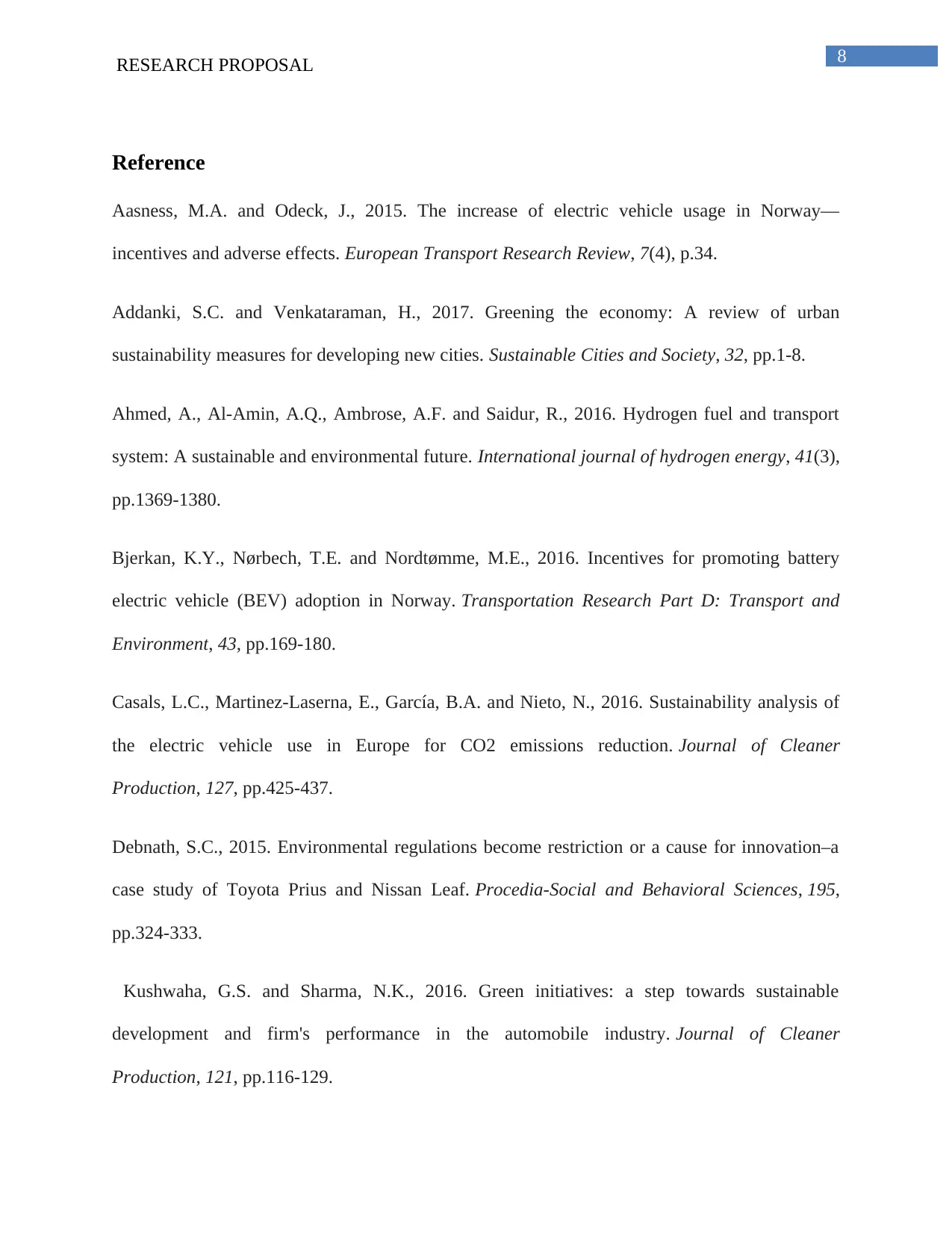
8RESEARCH PROPOSAL
Reference
Aasness, M.A. and Odeck, J., 2015. The increase of electric vehicle usage in Norway—
incentives and adverse effects. European Transport Research Review, 7(4), p.34.
Addanki, S.C. and Venkataraman, H., 2017. Greening the economy: A review of urban
sustainability measures for developing new cities. Sustainable Cities and Society, 32, pp.1-8.
Ahmed, A., Al-Amin, A.Q., Ambrose, A.F. and Saidur, R., 2016. Hydrogen fuel and transport
system: A sustainable and environmental future. International journal of hydrogen energy, 41(3),
pp.1369-1380.
Bjerkan, K.Y., Nørbech, T.E. and Nordtømme, M.E., 2016. Incentives for promoting battery
electric vehicle (BEV) adoption in Norway. Transportation Research Part D: Transport and
Environment, 43, pp.169-180.
Casals, L.C., Martinez-Laserna, E., García, B.A. and Nieto, N., 2016. Sustainability analysis of
the electric vehicle use in Europe for CO2 emissions reduction. Journal of Cleaner
Production, 127, pp.425-437.
Debnath, S.C., 2015. Environmental regulations become restriction or a cause for innovation–a
case study of Toyota Prius and Nissan Leaf. Procedia-Social and Behavioral Sciences, 195,
pp.324-333.
Kushwaha, G.S. and Sharma, N.K., 2016. Green initiatives: a step towards sustainable
development and firm's performance in the automobile industry. Journal of Cleaner
Production, 121, pp.116-129.
Reference
Aasness, M.A. and Odeck, J., 2015. The increase of electric vehicle usage in Norway—
incentives and adverse effects. European Transport Research Review, 7(4), p.34.
Addanki, S.C. and Venkataraman, H., 2017. Greening the economy: A review of urban
sustainability measures for developing new cities. Sustainable Cities and Society, 32, pp.1-8.
Ahmed, A., Al-Amin, A.Q., Ambrose, A.F. and Saidur, R., 2016. Hydrogen fuel and transport
system: A sustainable and environmental future. International journal of hydrogen energy, 41(3),
pp.1369-1380.
Bjerkan, K.Y., Nørbech, T.E. and Nordtømme, M.E., 2016. Incentives for promoting battery
electric vehicle (BEV) adoption in Norway. Transportation Research Part D: Transport and
Environment, 43, pp.169-180.
Casals, L.C., Martinez-Laserna, E., García, B.A. and Nieto, N., 2016. Sustainability analysis of
the electric vehicle use in Europe for CO2 emissions reduction. Journal of Cleaner
Production, 127, pp.425-437.
Debnath, S.C., 2015. Environmental regulations become restriction or a cause for innovation–a
case study of Toyota Prius and Nissan Leaf. Procedia-Social and Behavioral Sciences, 195,
pp.324-333.
Kushwaha, G.S. and Sharma, N.K., 2016. Green initiatives: a step towards sustainable
development and firm's performance in the automobile industry. Journal of Cleaner
Production, 121, pp.116-129.
⊘ This is a preview!⊘
Do you want full access?
Subscribe today to unlock all pages.

Trusted by 1+ million students worldwide
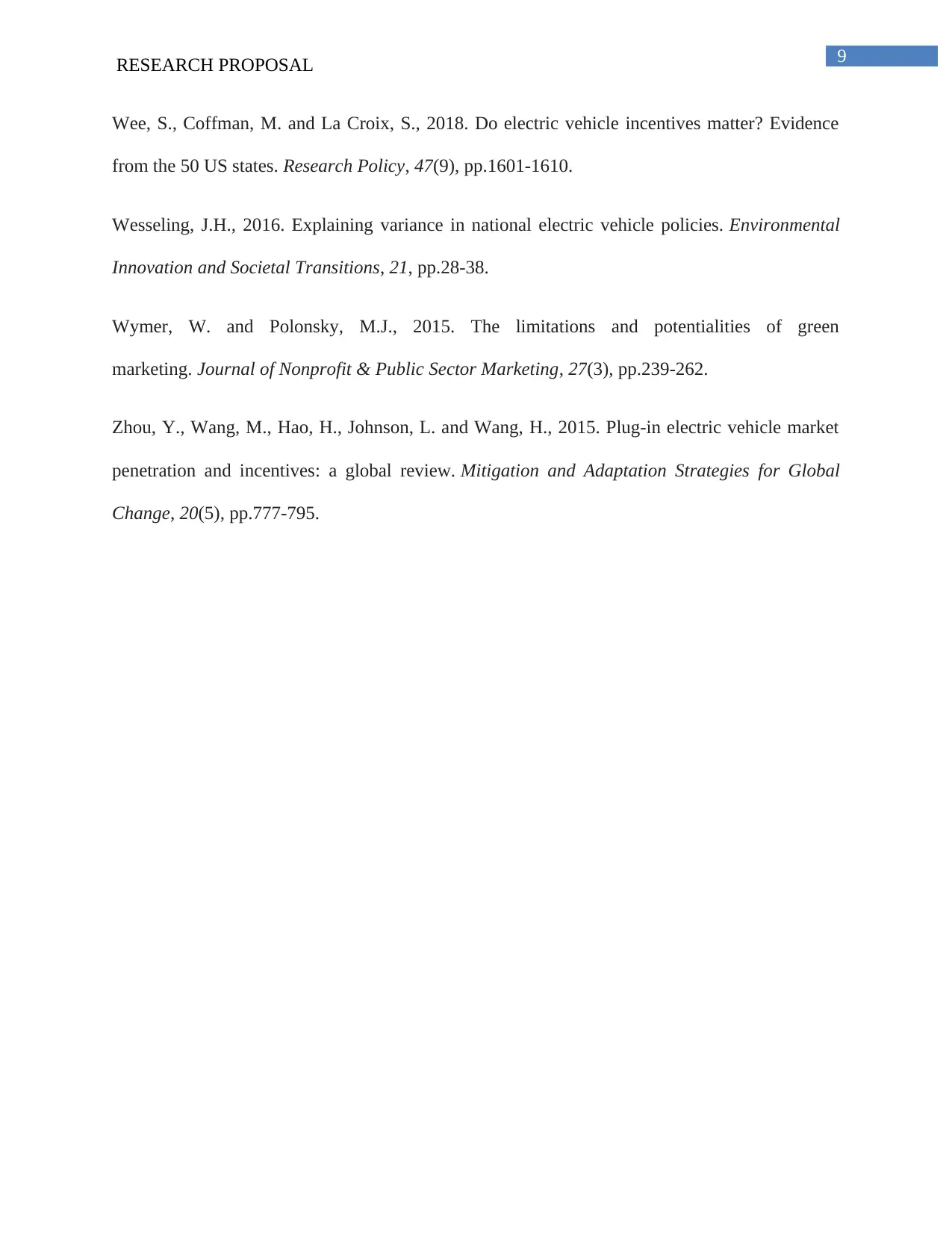
9RESEARCH PROPOSAL
Wee, S., Coffman, M. and La Croix, S., 2018. Do electric vehicle incentives matter? Evidence
from the 50 US states. Research Policy, 47(9), pp.1601-1610.
Wesseling, J.H., 2016. Explaining variance in national electric vehicle policies. Environmental
Innovation and Societal Transitions, 21, pp.28-38.
Wymer, W. and Polonsky, M.J., 2015. The limitations and potentialities of green
marketing. Journal of Nonprofit & Public Sector Marketing, 27(3), pp.239-262.
Zhou, Y., Wang, M., Hao, H., Johnson, L. and Wang, H., 2015. Plug-in electric vehicle market
penetration and incentives: a global review. Mitigation and Adaptation Strategies for Global
Change, 20(5), pp.777-795.
Wee, S., Coffman, M. and La Croix, S., 2018. Do electric vehicle incentives matter? Evidence
from the 50 US states. Research Policy, 47(9), pp.1601-1610.
Wesseling, J.H., 2016. Explaining variance in national electric vehicle policies. Environmental
Innovation and Societal Transitions, 21, pp.28-38.
Wymer, W. and Polonsky, M.J., 2015. The limitations and potentialities of green
marketing. Journal of Nonprofit & Public Sector Marketing, 27(3), pp.239-262.
Zhou, Y., Wang, M., Hao, H., Johnson, L. and Wang, H., 2015. Plug-in electric vehicle market
penetration and incentives: a global review. Mitigation and Adaptation Strategies for Global
Change, 20(5), pp.777-795.
1 out of 10
Related Documents
Your All-in-One AI-Powered Toolkit for Academic Success.
+13062052269
info@desklib.com
Available 24*7 on WhatsApp / Email
![[object Object]](/_next/static/media/star-bottom.7253800d.svg)
Unlock your academic potential
Copyright © 2020–2026 A2Z Services. All Rights Reserved. Developed and managed by ZUCOL.





